The results of the recent U.S. elections reveal a harsh truth: misogyny and racism are alive, thriving, and deeply entrenched in our systems.
Decentering men is the need of the hour—it’s no longer a choice.
From the systemic undermining of women’s rights to the rise of ideologies that glorify male dominance, the evidence is overwhelming.
The status quo isn’t just flawed; it’s dangerous.
Decentering men isn’t about rejecting individuals—it’s about dismantling the structures and cultural norms that prioritize male power, often at the expense of women’s safety, autonomy, and dignity.
The U.S. election results have sent a chilling message: men will not hesitate to put women in danger to maintain their dominance.
They thrive on controlling and intimidating women, with their hatred and fear of female empowerment laid bare.
From voting against female candidates out of fear that women will outperform them, to supporting systems that dismiss accountability for men’s actions, the pattern is clear.
What’s even more alarming is how “pick-me” women—those who throw other women under the bus for male approval—actively support this dynamic, perpetuating the cycle of misogyny and oppression.
Men don’t have to be qualified or prepared—they just have to exist, and society rallies behind them. Meanwhile, women are relentlessly scrutinized and undermined, even by those within their own gender.
This isn’t just about elections; it’s a global epidemic.
From Afghanistan to Iran, the erosion of women’s rights is treated with shocking indifference, while men rage against the imagined threat of feminism and accountability.
They fear false accusations, despite the minuscule likelihood of such claims, while ignoring the staggering lifetime risk of women facing sexual violence.
The rise of hate-driven ideologies—from the Taliban to Andrew Tate’s fan base and tech bros spewing misogyny online—proves that the hostility against women is not isolated but systemic. Hate crimes against women happen every day across the globe.
Men and pick-me women are making the world increasingly hostile for women to simply exist. It’s time to stop centering men and take the power back. We don’t owe them our silence, our submission, or our support.
Decentering men and stepping away from “pick-me” culture isn’t just an act of rebellion—it’s a path toward reclaiming agency, dismantling oppressive systems, and creating space for authentic self-expression.
By refusing to center men and rejecting the complicit role of “pick-me” women, we can begin to reclaim agency and build a world where women aren’t fighting for survival but thriving on their own terms. The time to act is now.
5 Reasons Decentering Men and Rejecting ‘Pick-Me’ Women Is Critical Now
1. Trump’s Growing Support Among Men and Women
Recent CBS News exit polls from the last two elections show a concerning shift in voter demographics:
- In 2020, Trump narrowly won men’s votes, 49% to 48%. By 2024, his male support rose significantly to 55%.
- Even among women voters, Trump increased his numbers from 43% in 2020 to 45% in 2024, despite Democrats emphasizing women’s issues like abortion rights.
These numbers indicate that societal attitudes supporting patriarchy and systemic inequities continue to hold sway, even in the face of progressive agendas.
Trump’s support among young Black men under 45 also surged:
- About 3 in 10 Black men in this demographic voted for Trump in 2024, roughly doubling his support from 2020.
- Kei Kawashima-Ginsberg, director of CIRCLE, noted this troubling milestone: “This is the first time young men as a whole group, not just white men, in aggregate chose president-elect Trump by majority.”
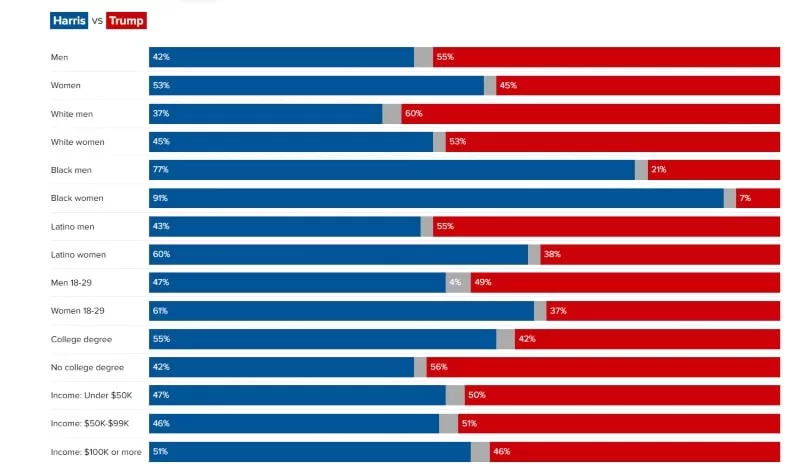
The infographic above from CBS News gives insights about voting statistics.
Pick-Me Women and Their Broader Impact on Women’s Rights
The continued support of patriarchal figures by women has significant societal consequences:
- In 2024, 45% of women voted for Trump, despite his openly sexist rhetoric and policies that harm women.
- Among white women, 53% supported Trump in the 2024 elections, demonstrating how internalized misogyny and racism contributes to undermining collective progress.
If women had collectively prioritized their rights, they could have prevented the election of leaders whose policies directly harm them.
This trend highlights the urgent need for women to recognize and challenge the societal conditioning that leads to pick-me behavior.
The following article analyzes why white women voted for Trump.
https://www.latimes.com/opinion/story/2024-11-07/white-women-vote-donald-trump-kamala-harris
Since 1980, women have registered and voted at higher rates than men in every presidential election.
The following chart from Paw Research Center gives insights about voter turnout rates by gender since 1980.
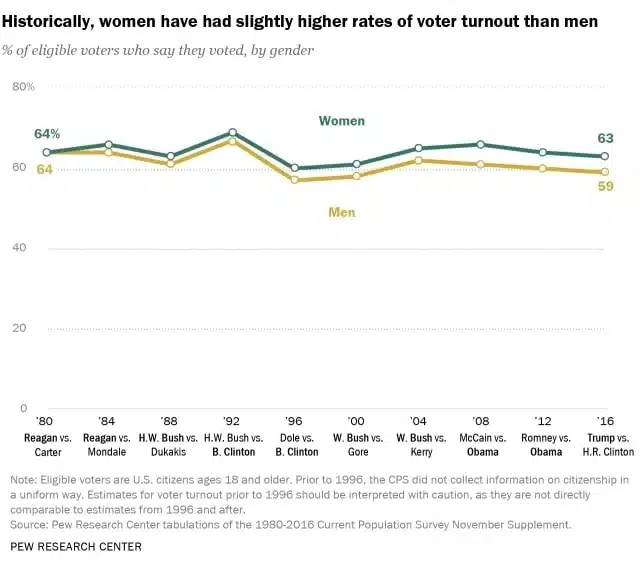
This demonstrates the potential power women hold in shaping political outcomes. However, when internalized misogyny leads to support for patriarchal figures, this power is diluted.
2. Republicans Flaunting “Pick-Me” Women for Political Gain
Republicans are employing the classic strategy of “divide and rule” to pit women against each other.
By targeting white women, particularly those with racist leanings, and pandering to “pick-me” voters, they’ve created a narrative that perpetuates division.
A clear example of this was their attack on Vice President Kamala Harris for being childless—a calculated move to undermine her competence and appeal to traditionalist voters.
They know they can rely on voters who prioritize patriarchal norms and align themselves with these regressive policies, despite the harm they cause to women as a whole.
Republicans strategically showcase wives and daughters onstage to reinforce patriarchal values. A glaring example is Usha Vance, a Yale-educated lawyer married to JD Vance, whose public appearances subtly bolster narratives about traditional family roles.
These women are often presented as symbols of support and loyalty, which perpetuates the idea that a woman’s worth lies in her role as a supporter of male ambitions.
Usha Vance’s story exemplifies how women’s worth is often tied to their roles as supporters of male ambitions:
- Despite her accomplished career, Usha is portrayed primarily as a loyal wife, furthering her husband’s political image.
- She defended her husband’s controversial “childless cat ladies” remark, reflecting internalized misogyny that values male approval over solidarity with other women.
- Vance said he considered Usha his “Yale spirit guide” when they were classmates.

Cultural Influences on “Pick-Me” Behavior
Usha Vance’s Indian heritage offers insight into the interplay between cultural expectations and patriarchy.
Usha Vance’s Indian heritage offers insight into the interplay between cultural expectations and patriarchy.
- Indian culture places a high value on family, often subordinating women’s aspirations to those of men, even when they are highly educated.
- In India, men doing the bare minimum is considered being a “great” husband—the standards are so low. She must have observed this dynamic in her own household growing up.
- A white man learning to cook Indian food and cooking for her mother, as she mentioned in an interview, is apparently considered a “great” quality in her husband.
Misogynist men like JD Vance want highly educated women as their wives to boost their own image, and she helped clean up his reputation after his controversial “childless cat ladies” remark.
Mrs. Vance, once a registered Democrat, now works as a corporate litigator at a law firm that is “radically progressive.”
This stark contrast highlights a pattern often seen in pick-me women: the willingness to reshape or abandon their own value system to center a man in their lives.
Misogyny and racism may have shaped Usha’s worldview, making a white man like JD Vance appear aspirational.
This dynamic underscores how intersectional factors—such as race and cultural norms—can contribute to pick-me behavior.
The following is a study analyzing the influence of cultural and racial dynamics on women’s alignment with patriarchy.
https://gap.hks.harvard.edu/sites/default/files/2021-08/14-Chapter%2014%20(Toosi%20et%20al).pdf
Usha Vance’s journey serves as a stark reminder of how deeply cultural expectations and patriarchy can shape women’s choices.
Men often only love and respect women as long as they meet their expectations or serve their needs.
The moment women assert their independence or challenge these expectations, that “respect” can quickly vanish.
Ironically, some women actively put themselves in harm’s way to uphold and uplift men, often at the expense of other women.
Pick-me women—those who seek male approval by aligning with patriarchal values—are notorious for betraying their own gender to gain favor with men. They believe that by playing their role, they will earn power and protection within the system.
Unfortunately, their loyalty rarely pays off. The same men they defend will eventually turn on them, just as they once turned on other women for male validation.
Pick-me culture is not just harmful to others—it’s a trap for the women who embrace it, perpetuating their own oppression.
3. Trump Won Both Elections While Publicly Embracing Sexism
Donald Trump didn’t just win elections—he mastered the art of weaponizing sexism to fuel his campaigns, polarize voters, and divide women into opposing factions.
His campaigns thrived on overt misogyny, amplified by influential platforms and targeted outreach to young men.
During an infamous Access Hollywood recording, he boasted about sexually assaulting women, claiming they let him “grab ’em by the pussy.”
This remark alone should have disqualified him in the eyes of many voters.
His predatory behavior has been legally recognized, most notably in the case involving magazine writer E. Jean Carroll, whom he sexually abused in the 1990s.
Instead of suffering political consequences, Trump used his actions to solidify support from a base that thrives on divisive ideologies.
His appointment of conservative Supreme Court justices who overturned Roe v. Wade further demonstrated his willingness to strip women of their bodily autonomy, cementing his role as a leader who actively undermines women’s rights.
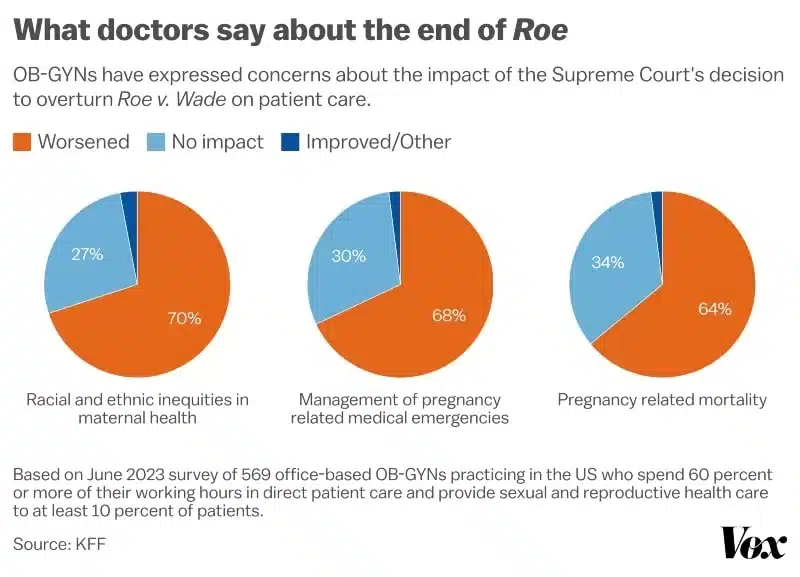
The above infographic from Vox illustrates the perspectives of medical professionals on the Supreme Court’s decision to overturn Roe v. Wade.
The election wins of Trump highlights how deeply ingrained sexism is, with many men harboring sexist beliefs and women internalizing misogyny.
Trump’s elections weren’t just about political wins; they revealed deeper societal fractures and the power of misogyny when left unchecked.
To move forward, it’s crucial to address how these divisions were exploited and how women can reclaim their collective power.
4. Normalization of Sexism and Downplaying Cruelty Toward Women
The normalization of sexism isn’t just happening—it’s thriving.
From powerful figures openly degrading women to everyday men amplifying this behavior, the cruelty directed at women is being downplayed and brushed off as “just the way things are.”
Powerful men like Elon Musk, Donald Trump, and JD Vance have paved the way for this cultural shift by being unapologetically sexist.
Their influence has emboldened others, leading to an increase in both online and offline abuse of women. The normalization of such behavior sends a clear message: men no longer feel the need to hide their sexism—they flaunt it.
An example of this came immediately after the elections, when posts by men claiming “your body, my choice” circulated widely on social media.
This chilling phrase mocked the reproductive rights of women and underscored the growing cruelty toward them in public discourse.
Attacks against women are becoming more frequent, both in digital spaces and in real life. Whether it’s outright harassment or subtle gaslighting, men are increasingly dismissive of women’s concerns.
Even “good” men often fail to act, choosing complacency over action, which only perpetuates these cycles of abuse.
The following infographic from Bloomberg highlights the surge in online abuse toward women in the days following the US election.
Phrases like “your body, my choice” and “get back to the kitchen” have exploded on platforms like X and TikTok since the election.
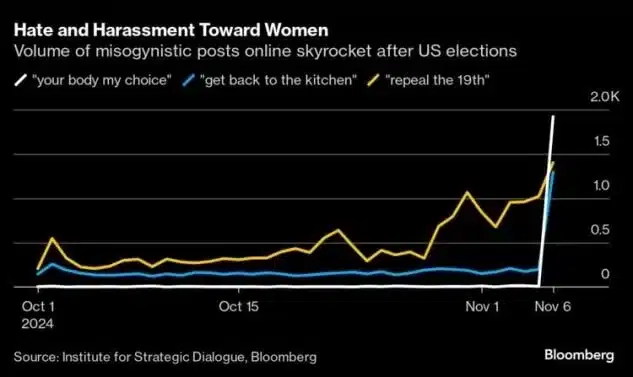
The dismissive attitudes extend beyond overtly sexist men. Even those who don’t openly align with misogyny often gaslight women into believing they’re “overreacting” when calling out discrimination.
These patterns create an exhausting environment for women, where their voices are either ignored or ridiculed.
The line between overt sexism and quiet complacency is thin.
Whether by active harm or passive inaction, the result is the same: women are left unsupported, their experiences minimized, and their rights increasingly at risk.
The following chart is from an article of Nature Reviews Psychology on ambivalent sexism — which encompasses both attitudes that are overtly negative (hostile sexism) and those that seem subjectively positive but are actually harmful (benevolent sexism)
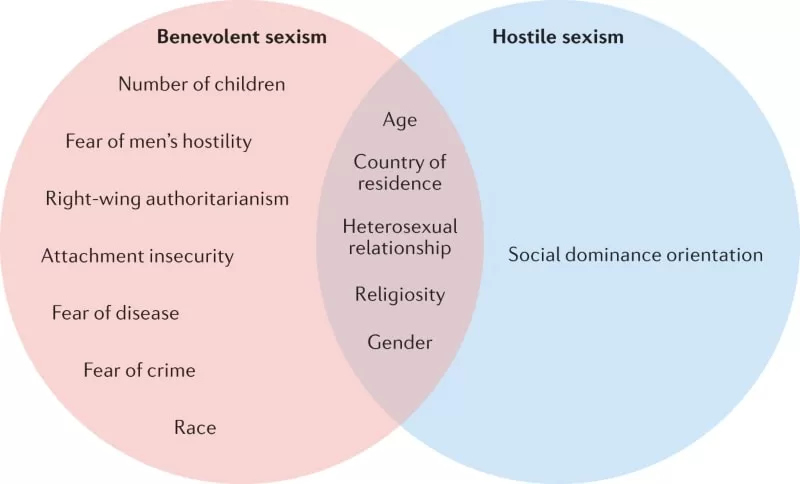
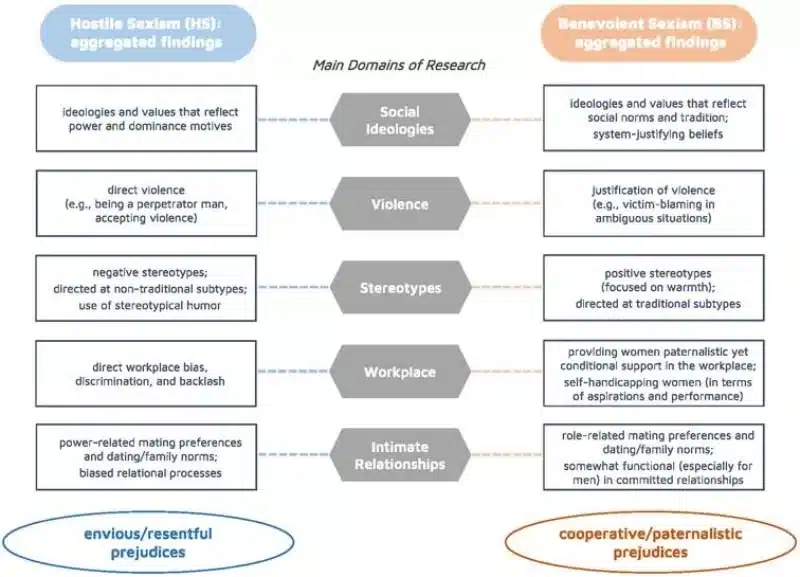
5. Radicalization of Men and Religions
From the Taliban’s grip on Afghanistan to the deaths of women in Iran for defying oppressive dress codes, the rise of radical ideologies across the globe reveals a chilling truth: the world’s collective silence is enabling the erosion of women’s rights.
When the Taliban reclaimed power in Afghanistan, women’s lives were thrust into darkness. Basic freedoms, including education, employment, and movement, were stripped away almost overnight.
The global response? A quiet shrug, wrapped in weak statements of concern that accomplished little.
In Iran, the situation is equally dire. Women are being killed for acts as simple as not covering their hair, a chilling reminder of how radical interpretations of religion are used to control and suppress.
Religions across the globe are becoming more radicalized in a race to outdo each other, with women often bearing the brunt of this extremism.
Male Radicalization
Meanwhile, in Western culture, a different but equally dangerous form of regression is taking root.
Influencers like “podcast bros” exploit social media algorithms to amplify traditional, patriarchal gender roles.
During Trump’s election night celebration, UFC President Dana White thanked figures like The Nelk Boys, Adin Ross, and Joe Rogan—platforms that resonate with young men and reinforce regressive ideas about masculinity and power.
This marriage of politics, online platforms, and influencers is fostering a generation of men who are being encouraged to view women as adversaries rather than equals.
The following is an article on misogynist radicalisation.
Algorithms often promote extreme content, normalizing misogynistic views and fostering a sense of belonging among those who feel disenfranchised.
Research indicates that spending time in these virtual spaces increases the likelihood of engaging with hate-filled or extremist content.
The rise of misogyny is not contained within specific regions or cultures—it is a global epidemic. The silence and inaction of governments and international bodies signal complicity, emboldening those who thrive on oppression.
Even in democratic nations, the normalization of regressive gender roles is advancing, fueled by charismatic influencers and politicians who court their followings by championing “traditional values.”
These shifts threaten decades of progress in women’s rights, reminding us that freedom for women anywhere is fragile.
The interconnected rise of radicalism, political complacency, and online influencers highlights an urgent need for decentering men and rejecting pick-me women.
Actionable Takeaways
1. Grassroots Advocacy
Grassroots policymaking refers to a bottom-up approach in which community members actively participate in the political process, advocating for changes that reflect their needs and interests.
This method contrasts with traditional top-down policymaking, where decisions are made by higher authorities without significant input from the affected populations.
How You Can Contribute
- Support Women-Focused Policies: Advocate for laws that protect and uplift women, such as equal pay legislation, comprehensive gender violence prevention programs, and expanded reproductive health access.
- Educate Yourself and Others: Understand how misogyny and racism intersect in politics. Read, share, and discuss resources that shed light on these issues.
- Start Conversations: Use your voice to challenge harmful narratives in your social and professional circles. Spark discussions that promote awareness and drive change.
The following infographic from simplystakeholders shows how to create a grassroot advocacy campaign.
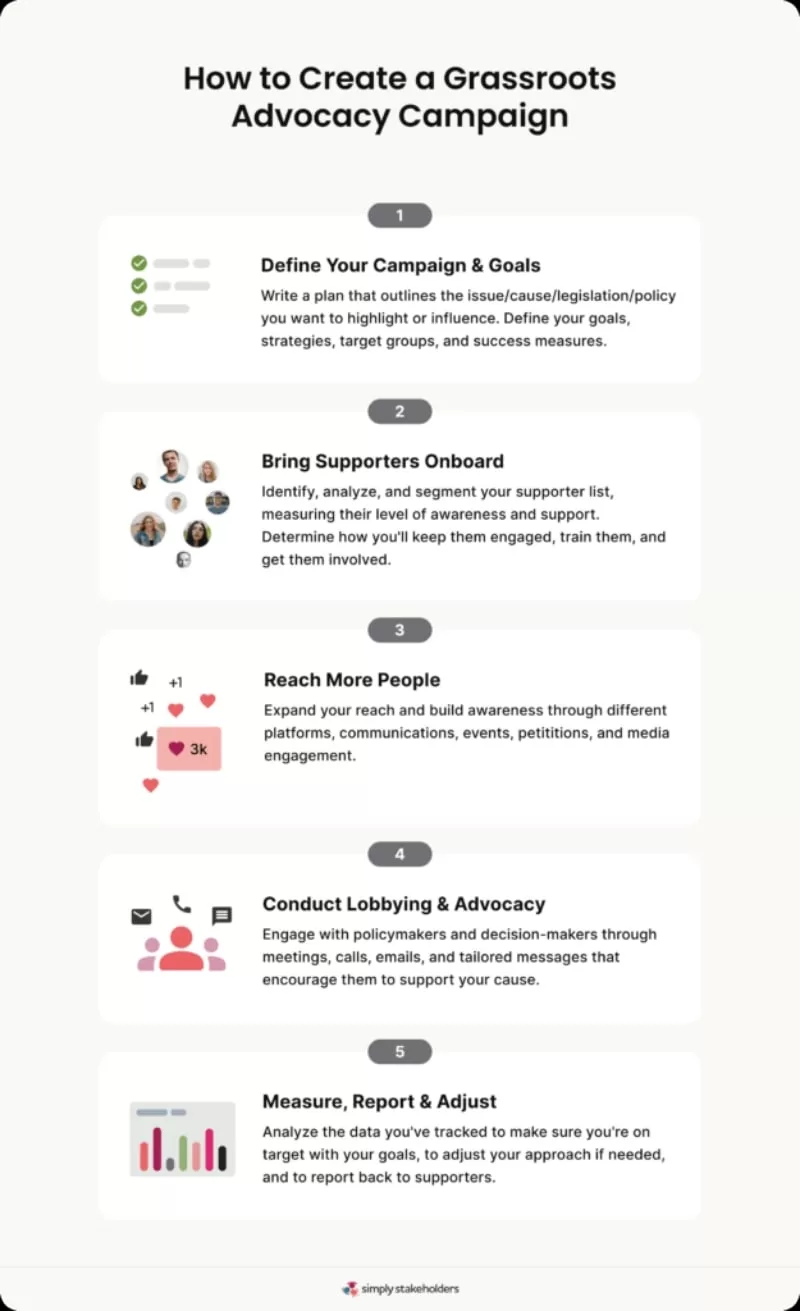
2. Decentering Men
We have previously explored the concept of decentering men in great detail in other blog posts. Here are some of those posts:
Decentering Men: 10 Strategies
Decentering Men in Your Workplace
Decentering Men in Your Personal Life
3. Reject ‘Pick-Me’ Culture
- Call out pick-me behavior: When you see women undermining other women to gain male approval, address it respectfully but firmly. Awareness is the first step toward change.
- Avoid enabling pick-me women: Refrain from offering emotional or physical labor to support women who prioritize pleasing men at the expense of others. The men they cater to rarely reciprocate such effort.
- Distance yourself if necessary: If feasible, cut pick-me women out of your life. Alternatively, adopt the grey rock method—stay neutral and disengaged to minimize their influence on your mental health.
4. Create and Support Female Narratives in Pop Culture
- Champion representation: Whether it’s art, entertainment, policymaking, or tech, advocate for and consume content that centers women’s experiences and perspectives.
- Support consciously: Make intentional choices to uplift female-driven projects, creators, and initiatives. Your support helps shift cultural narratives away from male-centric viewpoints.
5. Seek Alternatives to Existing Social Media
- Use social media mindfully: Limit your social media usage to platforms that promote women’s voices and narratives. Be selective about where and how you engage.
- Explore alternatives: Seek or develop platforms with algorithms designed to foster open discussions about women’s rights and issues, free from suppression or bias.
- Encourage innovation: If you have the resources, consider contributing to or creating new digital spaces that prioritize inclusivity and equality.
Conclusion
The U.S. elections were more than a political event—they were a mirror reflecting the deep misogyny and racism embedded in our society.
Decentering men and rejecting pick-me culture isn’t just important—it’s essential for progress. By taking action and standing together, women can push back against the systems that seek to divide and control them.
FAQs on Decentering Men
Decentering Menin practice means choosing not to prioritize a man’s needs over your own. It’s about recognizing your worth and setting boundaries that ensure your well-being comes first.
2. How does decentering men impact relationships with male friends?
Decentering men fundamentally alters how women engage with male friends, fostering a healthier balance of power and emotional investment.
3. How can decentering men influence professional settings?
Decentering men in professional settings empowers women to reclaim their identities, assert their needs, and foster more equitable workplace dynamics.
By focusing on personal growth and collaboration with other women, they contribute to a culture that values inclusivity and diversity, ultimately benefiting the entire organization.

